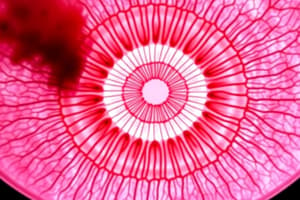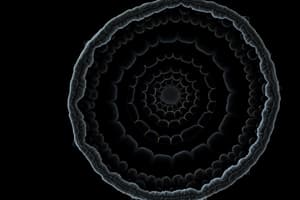Podcast
Questions and Answers
Which of the following is NOT a direct product of the trophoblast during week 2 of embryonic development?
Which of the following is NOT a direct product of the trophoblast during week 2 of embryonic development?
- Cytotrophoblast
- Epiblast (correct)
- Human Chorionic Gonadotropin (hCG)
- Syncytiotrophoblast
The exocoelomic membrane, which forms part of the yolk sac, is derived from which specific cell layer?
The exocoelomic membrane, which forms part of the yolk sac, is derived from which specific cell layer?
- Epiblast
- Syncytiotrophoblast
- Hypoblast (correct)
- Cytotrophoblast
Which structure is directly lined by the somatic mesoderm?
Which structure is directly lined by the somatic mesoderm?
- Amnion (correct)
- Connecting stalk
- Yolk sac
- Chorionic cavity
What is the primary function of the syncytiotrophoblast during week 2 of development?
What is the primary function of the syncytiotrophoblast during week 2 of development?
The bilaminar germ disc is composed of which two cell layers?
The bilaminar germ disc is composed of which two cell layers?
What is the origin of the extraembryonic mesoderm?
What is the origin of the extraembryonic mesoderm?
What is the clinical significance of a low level of human chorionic gonadotropin (hCG) during early pregnancy?
What is the clinical significance of a low level of human chorionic gonadotropin (hCG) during early pregnancy?
Which of the following structures is a diverticulum from the yolk sac, involved in early blood formation?
Which of the following structures is a diverticulum from the yolk sac, involved in early blood formation?
Flashcards
Trophoblast
Trophoblast
The outer layer of the blastocyst, responsible for implantation and placental formation.
Cytotrophoblast
Cytotrophoblast
Inner mononucleated cells of the trophoblast, forming the inner layer.
Syncytiotrophoblast
Syncytiotrophoblast
Outer multinucleated cells of the trophoblast, responsible for implantation and producing hCG.
Embryoblast
Embryoblast
Signup and view all the flashcards
Epiblast
Epiblast
Signup and view all the flashcards
Hypoblast
Hypoblast
Signup and view all the flashcards
Amniotic Cavity
Amniotic Cavity
Signup and view all the flashcards
Chorionic Cavity
Chorionic Cavity
Signup and view all the flashcards
Study Notes
Week 2 Embryonic Development
-
The bilaminar germ disc forms from two layers: the epiblast and hypoblast.
-
Trophoblast differentiates into two layers:
- Cytotrophoblast: Inner layer of mononucleated cells.
- Syncytiotrophoblast: Outer layer of multinucleated cells, involved in implantation and producing hCG.
-
Embryoblast differentiates into:
- Epiblast: Forms the amniotic cavity.
- Hypoblast: Migrates to form the exocoelomic membrane and lines the primary yolk sac.
-
Extraembryonic mesoderm develops from yolk sac cells, differentiates into:
- Somatic mesoderm: Lines the cytotrophoblast and amnion.
- Visceral mesoderm: Covers the yolk sac.
-
Amniotic cavity forms within the epiblast, filled with amniotic fluid.
-
The exocoelomic cavity (primary yolk sac) forms from hypoblast cells and exocoelomic membrane lined by extraembryonic mesoderm.
-
The chorionic cavity forms from spaces in the extraembryonic mesoderm.
-
The connecting stalk is composed of extraembryonic mesoderm and will become the umbilical cord.
-
Allantois, a diverticulum from the yolk sac, is involved in early blood formation.
hCG and Developmental Abnormalities
-
Human Chorionic Gonadotropin (hCG) is produced by the syncytiotrophoblast, maintaining corpus luteum, progesterone production, and used in pregnancy tests.
-
Low hCG levels indicate risk of spontaneous abortion or ectopic pregnancy.
-
High hCG levels may indicate multiple pregnancies or trophoblastic diseases.
-
Gestational trophoblastic diseases (GTD) include:
- Hydatidiform mole: Benign trophoblastic proliferation with high hCG and no embryo development.
- Choriocarcinoma: Malignant trophoblastic tumor, potentially metastasizing.
-
Ectopic pregnancy is implantation outside the uterus, most often occurring in the fallopian tubes, and can lead to severe complications like bleeding.
Studying That Suits You
Use AI to generate personalized quizzes and flashcards to suit your learning preferences.




